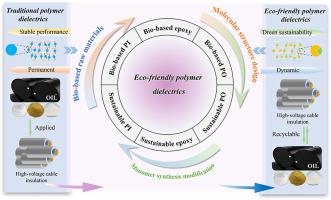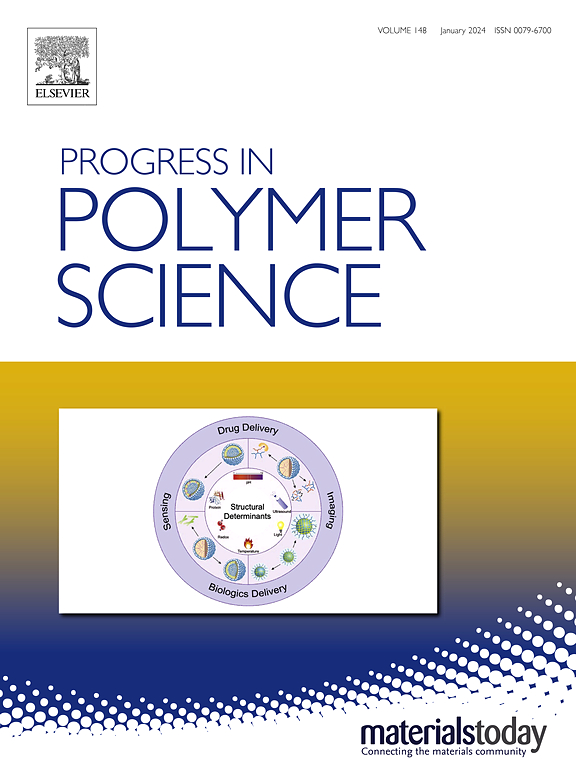Chemical structure design for eco-friendly dielectric polymer materials
IF 26.1
1区 化学
Q1 POLYMER SCIENCE
引用次数: 0
Abstract
Environmentally friendly dielectric polymer materials that can subjectively adapt to environmental changes and self-restore mechanical and electrical insulation properties continue to emerge. These adaptive systems are expected to revolutionize the development of smart grids, power electronic systems, and other fields. We will present a new trend emerging in environmentally friendly dielectric design that utilizes reversible chemistry (both non-covalent and covalent) to control reactions originating at the most fundamental (molecular) level. Dielectrics designed with this molecular structure will be able to heal or recycle themselves on a macroscopic scale as a result of changes in the molecular structure of the material (i.e., rearrangement or reorganization of polymer components or aggregates). However, the ability to design the molecular structure and ensure the original excellent properties of the dielectric is of interest to researchers. This review will summarize the challenges and opportunities in chemical structure modification with respect to the needs of dielectric application scenarios and specific examples. Furthermore, it will guide the design and preparation of environmentally friendly dielectrics and promote the development of interdisciplinary research between high-voltage insulation technology and polymer chemistry.


环保介质高分子材料的化学结构设计
能够主观上适应环境变化、自我恢复机电绝缘性能的环保型介电高分子材料不断涌现。这些自适应系统有望彻底改变智能电网、电力电子系统和其他领域的发展。我们将介绍环保电介质设计的新趋势,该设计利用可逆化学(非共价和共价)来控制源自最基本(分子)水平的反应。用这种分子结构设计的电介质将能够在宏观尺度上自我修复或再循环,因为材料的分子结构发生了变化(即聚合物组分或聚集体的重排或重组)。然而,设计分子结构并保证电介质原有优异性能的能力是研究人员感兴趣的问题。本文将根据电介质应用场景的需要和具体实例,总结化学结构改性的挑战和机遇。指导环境友好型介电材料的设计和制备,促进高压绝缘技术与高分子化学交叉研究的发展。
本文章由计算机程序翻译,如有差异,请以英文原文为准。
求助全文
约1分钟内获得全文
求助全文
来源期刊

Progress in Polymer Science
化学-高分子科学
CiteScore
48.70
自引率
1.10%
发文量
54
审稿时长
38 days
期刊介绍:
Progress in Polymer Science is a journal that publishes state-of-the-art overview articles in the field of polymer science and engineering. These articles are written by internationally recognized authorities in the discipline, making it a valuable resource for staying up-to-date with the latest developments in this rapidly growing field.
The journal serves as a link between original articles, innovations published in patents, and the most current knowledge of technology. It covers a wide range of topics within the traditional fields of polymer science, including chemistry, physics, and engineering involving polymers. Additionally, it explores interdisciplinary developing fields such as functional and specialty polymers, biomaterials, polymers in drug delivery, polymers in electronic applications, composites, conducting polymers, liquid crystalline materials, and the interphases between polymers and ceramics. The journal also highlights new fabrication techniques that are making significant contributions to the field.
The subject areas covered by Progress in Polymer Science include biomaterials, materials chemistry, organic chemistry, polymers and plastics, surfaces, coatings and films, and nanotechnology. The journal is indexed and abstracted in various databases, including Materials Science Citation Index, Chemical Abstracts, Engineering Index, Current Contents, FIZ Karlsruhe, Scopus, and INSPEC.
 求助内容:
求助内容: 应助结果提醒方式:
应助结果提醒方式:


